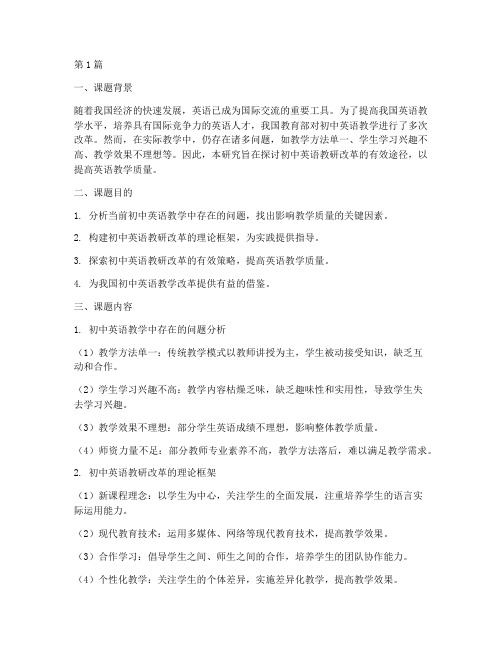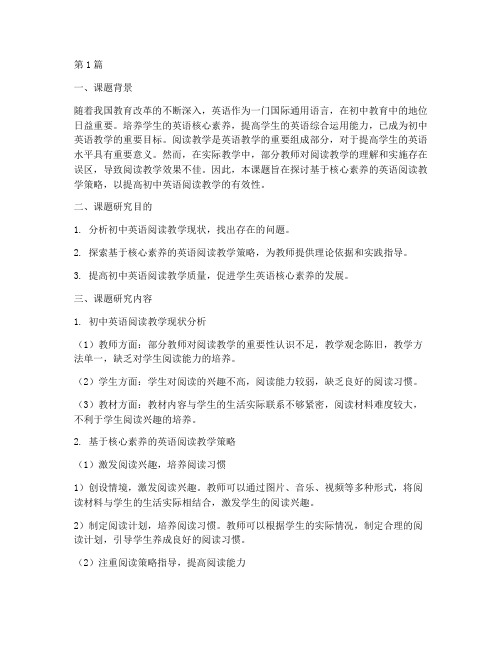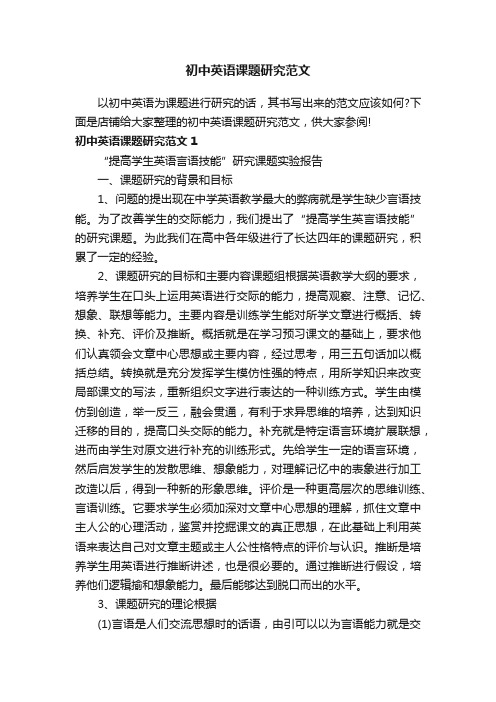初中英语课题研究
初中英语教研改革课题(3篇)

第1篇一、课题背景随着我国经济的快速发展,英语已成为国际交流的重要工具。
为了提高我国英语教学水平,培养具有国际竞争力的英语人才,我国教育部对初中英语教学进行了多次改革。
然而,在实际教学中,仍存在诸多问题,如教学方法单一、学生学习兴趣不高、教学效果不理想等。
因此,本研究旨在探讨初中英语教研改革的有效途径,以提高英语教学质量。
二、课题目的1. 分析当前初中英语教学中存在的问题,找出影响教学质量的关键因素。
2. 构建初中英语教研改革的理论框架,为实践提供指导。
3. 探索初中英语教研改革的有效策略,提高英语教学质量。
4. 为我国初中英语教学改革提供有益的借鉴。
三、课题内容1. 初中英语教学中存在的问题分析(1)教学方法单一:传统教学模式以教师讲授为主,学生被动接受知识,缺乏互动和合作。
(2)学生学习兴趣不高:教学内容枯燥乏味,缺乏趣味性和实用性,导致学生失去学习兴趣。
(3)教学效果不理想:部分学生英语成绩不理想,影响整体教学质量。
(4)师资力量不足:部分教师专业素养不高,教学方法落后,难以满足教学需求。
2. 初中英语教研改革的理论框架(1)新课程理念:以学生为中心,关注学生的全面发展,注重培养学生的语言实际运用能力。
(2)现代教育技术:运用多媒体、网络等现代教育技术,提高教学效果。
(3)合作学习:倡导学生之间、师生之间的合作,培养学生的团队协作能力。
(4)个性化教学:关注学生的个体差异,实施差异化教学,提高教学效果。
3. 初中英语教研改革的有效策略(1)优化教学内容:精选教学内容,注重趣味性、实用性和创新性,提高学生学习兴趣。
(2)改进教学方法:采用多种教学方法,如任务型教学、情境教学、合作学习等,提高教学效果。
(3)加强师资培训:提高教师的专业素养,培养教师运用现代教育技术的能力。
(4)关注学生个体差异:实施差异化教学,关注学生的个体需求,提高教学质量。
(5)加强家校合作:加强家校沟通,共同关注学生的英语学习,形成教育合力。
初中英语老师教研课题(3篇)

第1篇一、课题背景随着我国教育改革的不断深入,英语作为一门国际通用语言,在初中教育中的地位日益重要。
培养学生的英语核心素养,提高学生的英语综合运用能力,已成为初中英语教学的重要目标。
阅读教学是英语教学的重要组成部分,对于提高学生的英语水平具有重要意义。
然而,在实际教学中,部分教师对阅读教学的理解和实施存在误区,导致阅读教学效果不佳。
因此,本课题旨在探讨基于核心素养的英语阅读教学策略,以提高初中英语阅读教学的有效性。
二、课题研究目的1. 分析初中英语阅读教学现状,找出存在的问题。
2. 探索基于核心素养的英语阅读教学策略,为教师提供理论依据和实践指导。
3. 提高初中英语阅读教学质量,促进学生英语核心素养的发展。
三、课题研究内容1. 初中英语阅读教学现状分析(1)教师方面:部分教师对阅读教学的重要性认识不足,教学观念陈旧,教学方法单一,缺乏对学生阅读能力的培养。
(2)学生方面:学生对阅读的兴趣不高,阅读能力较弱,缺乏良好的阅读习惯。
(3)教材方面:教材内容与学生的生活实际联系不够紧密,阅读材料难度较大,不利于学生阅读兴趣的培养。
2. 基于核心素养的英语阅读教学策略(1)激发阅读兴趣,培养阅读习惯1)创设情境,激发阅读兴趣。
教师可以通过图片、音乐、视频等多种形式,将阅读材料与学生的生活实际相结合,激发学生的阅读兴趣。
2)制定阅读计划,培养阅读习惯。
教师可以根据学生的实际情况,制定合理的阅读计划,引导学生养成良好的阅读习惯。
(2)注重阅读策略指导,提高阅读能力1)教授阅读技巧。
教师应教授学生阅读技巧,如略读、寻读、扫读等,帮助学生提高阅读速度和理解能力。
2)培养学生的批判性思维。
教师应引导学生对阅读材料进行思考和分析,提高学生的批判性思维能力。
(3)加强阅读活动设计,提高阅读效果1)小组合作阅读。
教师可以组织学生进行小组合作阅读,培养学生的合作意识和团队精神。
2)角色扮演。
教师可以引导学生进行角色扮演,提高学生的口语表达能力和交际能力。
初中英语微型课题研究

初中英语微型课题研究篇一:初中英语小课题研究初中英语小课题研究《初中英语阅读欣赏课》研究(一)在初中开设阅读欣赏课,是贯彻《英语新课程标准》的要求。
基础教育阶段英语课程的任务是:激发和培养学生学习英语的兴趣,使学生树立自信心,养成良好的学习习惯和形成有效的学习策略,发展自主学习的能力和合作精神;使学生掌握一定的英语基础知识和听、说、读、写技能,形成一定的综合语言运用能力;培养学生的观察、记忆、思维、想象能力和创新精神;帮助学生了解世界和中西方文化的差异,拓展视野,培养爱国主义精神,形成健康的人生观、为他们的终生学习和发展打下良好的基础。
阅读,不仅是同学们必须掌握的一种技能,更是他们观察的内容之一,是了解世界和中希望文化差异,拓展视野等的基础手段之一。
在《课程标准》的内容标准中,更是明确规定了三、四、五级的阅读目标,其中有一项就是除教材外,课外阅读量应累计达到4万、10万、15万词以上。
(二)在初中开设阅读欣赏课,符合学生的认知规律。
“熟读唐诗三百首,不会作诗也会吟”。
众所周知,学语言,语言环境是非常重要的一个因素。
有了良好的语言环境,同学们可以在或主动或被动的情况下,去感知语言,进而理性的学习语言,为听、说、写的技能提高奠定基础。
从而才能够在文化意识、情感态度等方面得到提高。
(三)在初中开设阅读欣赏课,顺应素质教育和中、高考改革的需要。
开设阅读欣赏,不仅仅是对阅读能力的培养,也必将促进其他语言应用能力的提高。
同时,在阅读中,也可以获取大量信息,陶冶情操,提高综合素质。
在目前阶段,无论教育怎么改革,中、高考都是一个不可回避的话题。
同样,中、高考也是检验教学效果的一个重要指标。
无论中考还是高考,所有题型首先要面对的就是阅读。
在近年英语中考试卷中,直接考查学生阅读能力题型的权重不断增加。
阅读教学在英语教学中也就愈发重要。
二、专题研究的主要内容和目标。
研究内容:阅读欣赏课的阅读材料的组织、课堂设计以及阅读任务的设置。
初中课题研究《初中英语单元整体教学研究》课题研究报告

初中课题研究《初中英语单元整体教学研究》课题研究报告初中英语单元整体教学研究报告一、课题的提出自从大面积推广使用初中英语材以来,绝大多数英语教师的教学观念没有从根本上得到改变,这导致了传统的教学观念严重干扰了材教学思想的贯彻。
教师觉得材语言材料太多,语法知识零散,课不好教,课时紧;学生学得辛苦,跳不出“认知”的圈套,其语言运用能力差。
为了解决这些问题,我们提出了初中英语单元整体教学研究。
该研究的构想旨在为教师如何使用好材提供一套科学且操作性强的教学模式。
二、课题研究的内涵一)单元整体教学的概念初中英语单元整体教学是指将整个初中教材作为一个整体,以促进学生的整体发展和持续发展为目的,细化到每个单元。
在教学中,正确把握各单元之间及每个单元的各课之间的联系,科学合理地安排各课的教学内容和教学重、难点,形成以听、说、读、写、演为各自侧重点的不同课型的教学模式,综合训练学生使用英语的能力和培养他们自主研究的能力。
二)课题研究的内涵单元整体教学强调的是它的整体性;从研究方向上看,关注的是理论先行,实践探索为主旨;从研究内容上看,关注外语课堂教学的多个方面,探索性地多角度切入。
三、研究的理论和实施基础一)理论依据1、整体原理认为事物的整体功能大于部分功能之和,人们认识事物总是按照总-分-总的规律,这样对事物的评价才具有综合性、全面性。
2、八十年代的课文整体教学的成功实施为单元整体教学提供了实践基础。
二)课题研究的突破单元整体教学与课文整体教学一脉相承(强调整体功能大于部分功能之和),但也有不同之处。
课文整体教学要求教师整体把握教材的每篇课文,单元整体教学要求教师整体把握教材中的每一个单元。
这样的要求是为了适应材的编排体系和编写方式。
初中英语材按单元安排教学内容,每一个单元设置一个交际项目(即话题),单元内的四课题围绕话题展开又独立成篇,构成一个有机的单元整体。
单元整体教学将在以下几方面有所突破。
1、在教学中,常常会遇到各单元间及单元内四课间的教学内容不平衡的矛盾。
《初中英语学习策略的研究》课题结题报告

《初中英语学习策略的研究》课题结题报
告
初中英语研究策略的研究
一、背景
随着全球化进程的加快和英语的日益普及,英语已经成为一个世界性的语言。
初中阶段是培养学生英语语言能力的重要时期,因此研究初中英语研究策略具有重要的理论和实践意义。
二、研究目的
本研究旨在探究初中生英语研究策略的现状和问题,并提出相应的解决策略,以促进学生英语研究效果的提高。
三、研究内容
1. 对初中生英语研究策略的现状进行调查研究;
2. 分析初中生英语研究策略所存在的问题;
3. 提出改进初中生英语研究策略的方法和措施。
四、研究方法
本研究采用问卷调查法和访谈法相结合的方式进行,对某初中的部分学生进行数据收集和分析。
五、研究结果
1. 调查结果显示,初中生英语研究策略普遍不充分;
2. 分析初中生英语研究策略存在的问题及原因;
3. 提出了相应的改进策略和措施,如开设研究策略课程等。
六、结论
本研究对初中英语研究策略进行了实证研究,旨在提出相应的解决策略,促进学生英语研究效果的提高。
七、参考文献
(略)。
英语教研课题研初中(3篇)

第1篇Abstract:This research aims to explore effective strategies for improving English teaching and learning in junior high schools. By conducting a comprehensive study, this research will identify the challenges faced by teachers and students, propose innovative teaching methods, and provide practical recommendations for enhancing the overall English language proficiency of junior high school students.Introduction:English has become an essential language in today's globalized world. As junior high school students transition from primary education to secondary education, their English language skills play a crucial rolein their academic and professional development. However, the traditional teaching methods often fail to cater to the diverse needs of students, resulting in a lack of motivation and low achievement levels. This research aims to address these issues by exploring research-based approaches to enhance English teaching and learning in junior high schools.1. Literature Review1.1 Theoretical FrameworkThe research will be based on several theoretical frameworks, including the Communicative Language Teaching (CLT) approach, the constructivist learning theory, and the sociocultural theory of learning. These frameworks will provide a foundation for understanding the complexities of English language teaching and learning in junior high schools.1.2 Existing ResearchA review of existing literature will be conducted to identify the current trends and challenges in English teaching and learning in junior high schools. This review will help identify gaps in the research and guide the development of the research objectives.2. Research Objectives2.1 To identify the challenges faced by teachers and students in English teaching and learning in junior high schools.2.2 To explore innovative teaching methods that can enhance the English language proficiency of junior high school students.2.3 To propose practical recommendations for enhancing the overall English language proficiency of junior high school students.3. Research Methodology3.1 Quantitative ResearchA survey will be conducted to collect data from a sample of junior high school teachers and students. The survey will cover various aspects of English teaching and learning, including the use of technology, classroom management, and student motivation.3.2 Qualitative ResearchIn-depth interviews will be conducted with a select group of teachers and students to gain insights into their experiences and perceptions of English teaching and learning in junior high schools. These interviews will be analyzed using thematic analysis to identify common themes and patterns.4. Results4.1 Challenges Faced by Teachers and StudentsThe research will identify the challenges faced by teachers and students in English teaching and learning. These challenges may include a lack of resources, inadequate training, and the need for a more student-centered approach.4.2 Innovative Teaching MethodsThe research will explore innovative teaching methods that can enhance the English language proficiency of junior high school students. Thesemethods may include project-based learning, flipped classrooms, and gamified learning.4.3 Practical RecommendationsBased on the findings of the research, practical recommendations will be proposed for enhancing the overall English language proficiency ofjunior high school students. These recommendations will focus on teacher training, curriculum development, and the use of technology in the classroom.5. ConclusionThis research will contribute to the field of English language teaching and learning by providing insights into the challenges faced by teachers and students in junior high schools. The proposed strategies and recommendations will help educators develop effective teaching methods that cater to the diverse needs of students. By implementing these research-based approaches, junior high schools can enhance the English language proficiency of their students, preparing them for success in the globalized world.References:1. Brown, H. D. (2007). Principles of language learning and teaching(5th ed.). New York: Pearson.2. Nation, I. (2001). Language curriculum design. Cambridge: Cambridge University Press.3. Nunan, D. (1991). Language teaching methodology: A textbook for teachers. Hertfordshire: Prentice Hall International.4. Richards, J. C., & Rodgers, T. S. (2001). Approaches and methods in language teaching (2nd ed.). Cambridge: Cambridge University Press.5. Swain, M. (1985). Communicative competence: Some roles of comprehensible input and comprehensible output in its development. In G. Cook & B. Seidlhofer (Eds.), Principle and practice in appliedlinguistics (pp. 129-160). Oxford: Oxford University Press.第2篇Abstract:This research study aims to explore and analyze the current state of English language teaching in junior high schools in [Country/City]. The study will focus on identifying effective teaching strategies, challenges faced by teachers and students, and the overall impact of English language education on students' academic and personal development. Through a mixed-methods approach, including surveys, interviews, and classroom observations, this research will provide valuable insights into improving English language teaching practices in junior high schools.Introduction:The importance of English language proficiency cannot be overstated in today's globalized world. As a gateway to international communication, culture, and knowledge, English language education plays a crucial role in the development of students in junior high schools. However, despite the recognition of its significance, there are various challenges faced by teachers and students in the teaching and learning process. This research study aims to address these challenges and propose strategies to enhance English language teaching in junior high schools.1. Background and Significance:1.1 The increasing demand for English proficiency in the global job market.1.2 The importance of English language education in fostering critical thinking and communication skills.1.3 The need to adapt teaching methods to cater to the diverse needs of students.2. Literature Review:2.1 Current trends in English language teaching.2.2 Effective teaching strategies and methodologies.2.3 Challenges faced by teachers and students in junior high schools.2.4 Impact of English language education on students' academic and personal development.3. Research Objectives:3.1 To identify the current state of English language teaching in junior high schools.3.2 To analyze the effectiveness of different teaching strategies and methodologies.3.3 To explore the challenges faced by teachers and students in the English language classroom.3.4 To propose strategies for enhancing English language teaching in junior high schools.4. Research Methodology:4.1 Mixed-methods approach: combining quantitative and qualitative data collection methods.4.2 Surveys: administering questionnaires to teachers and students to gather data on their experiences and perceptions.4.3 Interviews: conducting in-depth interviews with selected teachers and students to gain insights into their experiences and challenges.4.4 Classroom observations: observing English language classes to analyze teaching practices and student engagement.5. Data Analysis:5.1 Quantitative data analysis: using statistical software to analyze survey data.5.2 Qualitative data analysis: employing thematic analysis to identify patterns and themes in interview and observation data.6. Results:6.1 Analysis of survey data: identifying common challenges and strengths in English language teaching.6.2 Analysis of interview data: exploring the personal experiences and insights of teachers and students.6.3 Analysis of classroom observations: evaluating the effectiveness of teaching strategies and student engagement.7. Discussion:7.1 Discussion of the findings, highlighting key trends and challenges.7.2 Comparison of the research findings with existing literature.7.3 Implications for English language teaching in junior high schools.8. Recommendations:8.1 Strategies for enhancing English language teaching, including the integration of technology, flipped classrooms, and project-based learning.8.2 Professional development opportunities for teachers to improve their pedagogical skills.8.3 Support systems for students to overcome learning difficulties and improve their English proficiency.9. Conclusion:This research study provides valuable insights into the current state of English language teaching in junior high schools. By identifying effective teaching strategies and addressing the challenges faced by teachers and students, this study aims to contribute to the improvement of English language education in junior high schools. The findings of this study can be used to inform policy-making, professional development initiatives, and classroom practices.References:[Include a list of relevant academic articles, books, and other resources used in the research study.]Appendices:[Include any additional materials, such as survey questionnaires, interview guides, and observation protocols.]---This outline provides a comprehensive structure for a research study on enhancing English language teaching in junior high schools. The actual content of the research paper would require detailed data collection, analysis, and discussion based on the specific context and findings of the study.第3篇Abstract:This research-based English teaching and research topic aims to explore effective strategies and methodologies to enhance English language learning in junior high schools. The study will focus on identifying the current challenges faced by junior high school students in learning English, analyzing the impact of various teaching methods on student achievement, and proposing practical solutions to improve the overall English proficiency of students. The research will be conducted through a mixed-methods approach, including surveys, interviews, and classroom observations.I. IntroductionThe English language has become an essential tool for global communication and an important part of the curriculum in many countries. Junior high school students are at a critical stage of language development, where their foundational skills in English cansignificantly impact their future academic and professional lives. However, many students face various challenges in learning English, such as lack of motivation, ineffective teaching methods, and insufficient exposure to the language. This research aims to address these issues andpropose practical solutions to improve English language learning in junior high schools.II. Background and Significance2.1 Current Challenges in English Language LearningIn junior high schools, students often encounter several challenges in learning English, including:- Lack of motivation: Many students find English learning monotonous and irrelevant to their daily lives.- Inadequate vocabulary: Students struggle with building a strong vocabulary base, which hinders their ability to express themselves effectively.- Ineffective teaching methods: Traditional teaching approaches may not cater to the diverse learning styles and needs of students.- Insufficient exposure to the language: Limited opportunities for real-life language use can hinder language development.2.2 Significance of the ResearchThe research aims to:- Identify the specific challenges faced by junior high school students in learning English.- Analyze the impact of various teaching methods on student achievement.- Propose practical solutions to improve English language learning outcomes.- Provide insights for English teachers and administrators to develop effective teaching strategies.III. Research MethodologyThis study will adopt a mixed-methods approach, combining quantitative and qualitative data collection methods. The following methods will be used:3.1 SurveysA survey will be designed to gather data from a sample of junior high school students and teachers. The survey will cover aspects such as students' motivation, learning styles, vocabulary knowledge, and their perceptions of the teaching methods used.3.2 InterviewsIn-depth interviews will be conducted with selected English teachers to explore their perspectives on teaching English in junior high schools. The interviews will focus on their experiences, challenges, and strategies for improving student learning outcomes.3.3 Classroom ObservationsClassroom observations will be conducted to assess the effectiveness of different teaching methods and to identify areas for improvement. Observations will be carried out in various classrooms and will include both formative and summative assessments.IV. Results and Discussion4.1 Analysis of Survey DataThe survey data will be analyzed to identify the most common challenges faced by students in learning English. It will also provide insightsinto the effectiveness of current teaching methods and the level of student motivation.4.2 Analysis of Interview DataThe interview data will be thematically analyzed to identify common themes and patterns in teachers' experiences and strategies. This analysis will help in understanding the challenges faced by teachers and the potential solutions to improve English language learning.4.3 Analysis of Classroom ObservationsThe classroom observations will be used to identify effective teaching strategies and areas that require improvement. The findings will be discussed in the context of the overall goal of enhancing English language learning in junior high schools.V. RecommendationsBased on the research findings, the following recommendations will be proposed:5.1 Enhancing Student Motivation- Incorporate real-life contexts and applications of English in various subjects.- Use multimedia resources and technology to make learning more engaging.- Provide opportunities for students to practice English in group activities and projects.5.2 Improving Vocabulary Knowledge- Introduce vocabulary through various activities, such as games, songs, and stories.- Encourage students to use new vocabulary in their daily language use.- Provide regular vocabulary tests and quizzes to reinforce learning.5.3 Adopting Effective Teaching Methods- Implement a variety of teaching methods, such as task-based learning, cooperative learning, and project-based learning.- Personalize instruction to cater to the diverse learning styles and needs of students.- Provide professional development opportunities for teachers to enhance their teaching skills.VI. ConclusionThis research-based English teaching and research topic has explored the challenges faced by junior high school students in learning English and the impact of various teaching methods on student achievement. By proposing practical solutions and recommendations, the study aims to contribute to the improvement of English language learning outcomes in junior high schools. The findings and recommendations can serve as a valuable resource for English teachers, administrators, and policymakers to enhance the quality of English language education in junior high schools.。
初中英语课题研究范文

初中英语课题研究范文以初中英语为课题进行研究的话,其书写出来的范文应该如何?下面是店铺给大家整理的初中英语课题研究范文,供大家参阅!初中英语课题研究范文1“提高学生英语言语技能”研究课题实验报告一、课题研究的背景和目标1、问题的提出现在中学英语教学最大的弊病就是学生缺少言语技能。
为了改善学生的交际能力,我们提出了“提高学生英言语技能”的研究课题。
为此我们在高中各年级进行了长达四年的课题研究,积累了一定的经验。
2、课题研究的目标和主要内容课题组根据英语教学大纲的要求,培养学生在口头上运用英语进行交际的能力,提高观察、注意、记忆、想象、联想等能力。
主要内容是训练学生能对所学文章进行概括、转换、补充、评价及推断。
概括就是在学习预习课文的基础上,要求他们认真领会文章中心思想或主要内容,经过思考,用三五句话加以概括总结。
转换就是充分发挥学生模仿性强的特点,用所学知识来改变局部课文的写法,重新组织文字进行表达的一种训练方式。
学生由模仿到创造,举一反三,融会贯通,有利于求异思维的培养,达到知识迁移的目的,提高口头交际的能力。
补充就是特定语言环境扩展联想,进而由学生对原文进行补充的训练形式。
先给学生一定的语言环境,然后启发学生的发散思维、想象能力,对理解记忆中的表象进行加工改造以后,得到一种新的形象思维。
评价是一种更高层次的思维训练、言语训练。
它要求学生必须加深对文章中心思想的理解,抓住文章中主人公的心理活动,鉴赏并挖掘课文的真正思想,在此基础上利用英语来表达自己对文章主题或主人公性格特点的评价与认识。
推断是培养学生用英语进行推断讲述,也是很必要的。
通过推断进行假设,培养他们逻辑揄和想象能力。
最后能够达到脱口而出的水平。
3、课题研究的理论根据(1)言语是人们交流思想时的话语,由引可以以为言语能力就是交际能力。
言语能力能够把语言知识和言语知识灵活又得体应用于语言交际。
言语能力以语言能力为基础。
但语言能力并不能“自然”地转化为言语能力。
初中英语阅读教学研究课题方案

初中英语阅读教学研究课题方案自从我接触教育行业以来,就已经深深爱上了这个充满挑战和成就感的领域。
十年来,我一直在探索如何提高初中英语阅读教学的效果。
今天,就让我们一起探讨一下这个课题方案。
一、研究背景随着全球化的加速,英语已经成为了一种国际性的交流工具。
在我国,英语教育从小学生阶段就开始了。
然而,在初中阶段,很多学生仍然面临着阅读困难的问题。
为了提高学生的英语阅读能力,我们有必要对初中英语阅读教学进行研究。
二、研究目的1.分析初中英语阅读教学的现状,找出存在的问题。
2.探索提高初中英语阅读教学效果的方法和策略。
3.为我国初中英语阅读教学提供有益的参考。
三、研究内容1.初中英语阅读教学现状分析(1)学生层面:分析学生在阅读过程中遇到的问题,如词汇量不足、语法知识不扎实、阅读技巧缺乏等。
(2)教师层面:分析教师在阅读教学过程中的教学策略、教学方法、教学评价等。
2.提高初中英语阅读教学效果的方法和策略(1)词汇教学:通过词汇教学,帮助学生扩大词汇量,提高阅读理解能力。
(2)语法教学:通过语法教学,帮助学生掌握英语语法规则,提高阅读理解能力。
(3)阅读技巧训练:通过阅读技巧训练,帮助学生掌握阅读技巧,提高阅读速度和理解能力。
(4)教学评价:通过教学评价,了解学生的学习情况,调整教学策略。
3.实证研究(1)选取实验班级和对照班级,对实验班级进行阅读教学干预。
(2)对比实验班级和对照班级的阅读成绩,分析干预效果。
四、研究方法1.文献综述:通过查阅相关文献,了解国内外初中英语阅读教学的研究现状。
2.问卷调查:设计问卷,调查学生和教师在阅读教学过程中的实际情况。
3.实证研究:通过实证研究,验证干预措施的有效性。
4.数据分析:对收集到的数据进行整理和分析,得出研究结论。
五、研究进度安排1.第一阶段(1-3个月):进行文献综述,了解研究现状。
2.第二阶段(4-6个月):设计问卷,进行问卷调查。
3.第三阶段(7-9个月):进行实证研究,对比实验班级和对照班级的阅读成绩。
- 1、下载文档前请自行甄别文档内容的完整性,平台不提供额外的编辑、内容补充、找答案等附加服务。
- 2、"仅部分预览"的文档,不可在线预览部分如存在完整性等问题,可反馈申请退款(可完整预览的文档不适用该条件!)。
- 3、如文档侵犯您的权益,请联系客服反馈,我们会尽快为您处理(人工客服工作时间:9:00-18:30)。
初中英语阅读教学实践与研究朱巧萍王宏丽王丽娟【摘要】:在中学加强英语阅读教学、强化学生的阅读能力、提高学生的阅读水平,培养学生的阅读习惯是英语课程改革的必然趋势。
本文根据中学生英语教学的现状,着重探讨在中学进行英语阅读教学的必要性及如何在中学实践阅读教学。
【关键词】:英语阅读教学一、课题的提出中学英语教学大纲指出:“阅读是理解和吸收书面信息的能力,它有助于扩大词汇量,丰富语言知识,了解英语国家的社会文化背景,阅读也是人们获得信息和知识的主要手段。
”当前,“学英语难,学好英语更难”,我们每个初中生都从心里发出这样的感慨.那么,怎么样才能学好英语呢?我们认为学好英语的关键在语感,因为语感是语言的灵魂.而语感的获得又与阅读休憩相关。
因此,要学好英语,有必要培养良好的阅读习惯,掌握科学的阅读方法。
然而,在初中阶段,虽然阅读教学一直倍受从事英语教学的教育工作者的重视,但效果却不理想.问题的关键在哪里呢?我们在多年教学实践中感到学生由于接触和使用英语的时空受到一定的限制,许多学生知道一个个单词的意思,但连词成句,连句成篇之后却又不知道它们的意思了。
造成这种现象的一个重要原因是现行的中学英语并无明确的英语阅读教学目标和配套的阅读教材,因此进行英语阅读教学研究不仅具有重要的现实意义,更是提高学生英语阅读能力,为其终生发展奠定基础的必然趋势,也是时代发展的必然趋势。
本课题《初中英语阅读教学实践与研究》的开展,正是基于这样的背景提出的,它有如下的理论意义和实践意义:1、有利于教师进一步更新观念,改变传统的教学方式。
对小学英语阅读教学的研究与实践,就是要引导教师转变教学观念,树立以人为本、促进发展的课程观和学生观,突破接受学习的定势,探索引导学生英语阅读的教学方式和策略,不断提高课堂教学效益。
2、有利于发展学生的探究学习能力。
阅读教学应“逐步培养学生探究性阅读和创造性阅读的能力”。
所谓探究性阅读,就是在教师的指导下,学生通过研究探索的方式自主地阅读获取和运用的一种学习方式。
3、有利于拓展教学内容,开阔学生的知识视野,使阅读教学课堂从封闭走向开放,体现用英语做事的教学思想。
二、课题研究的理论依据1、古德曼(K.S.Goodman)在1972年指出:“阅读是对三种相互有关而各有区别的信息,即形符的、句法的和语义的信息,进行信息处理的一种形式。
”英语阅读包括了朗读和默读。
但主要是借助视觉进行默读。
默读是最符合实际需要的方式。
默读要求把注意点放在理解语言单位上,速度较快。
现在的中学生普遍存在阅读速度慢、理解能力弱的现象。
导致这种现象有多方面的原因,如情感因素,方法与策略因素,智力因素。
但在我的教学中,我发现其主要原因是语言因素限制了学生英语阅读能力的形成。
所谓的语言因素是指字母、单词、习语、短语和语法规则等。
当学生遇到新单词或新句式时,立即产生了畏惧感,觉得束手无策,思路混乱。
其次,学生缺乏阅读的兴趣。
大部分学生除了作业中的阅读练习,从来不主动阅读课外材料。
再者,学生对阅读的内容缺乏深层的理解。
2、现代语言教学理论认为,学习语言的首要条件是保证足够的可理解的语言信息输入,因此听和读是学习英语能否成功的关键。
但现有条件下,依靠听力输入毕竟有诸多限制,而阅读则是可行和可靠的。
现行英语教材,重视了听说能力的培养,却在一定程度上忽视了读和写技能的训练。
因此,有必要对小学生英语阅读技能的训练进行探讨与研究。
外语教学心理学认为,阅读是一个认识和言语交际的过程,也是极为复杂的生理和心理过程。
阅读的过程实质上就是读者对语言信息理解过程。
因此,在阅读教学中,假如教师只是让学生读文章,做练习题,朗读,而忽视学生的情感体验,都是违背阅读心理规律的,势必影响阅读教学效果,也难以有效地提高学生的阅读能力。
3、语言学研究成果语言学习包括听,说,读,写,译,是一个input(输入),decoding(解码),output(输出)的过程。
听和读是输入,说和写是输出,但只须达到一定的输入量,才能保证更好的输出。
从而高效率地完成我们学习语言的目标。
而大量的阅读正是语言输入转为输出的必不可少的途径。
我们古人也早就总结“熟读唐诗三百首,不会写诗也会吟”的有益经验。
可见阅读在语言学习中的重要性了。
三、课题研究主要目标和内容(一)课题研究主要目标国家英语课程标准指出:学习和发展是英语课程标准的出发点和归宿。
因此我们的目标是:通过研究,探索中学英语阅读教学的有效方法,构建一套能充分发挥学生的潜能,使学生能掌握基本阅读技巧,提高阅读能力,并深受学生喜欢的阅读教学模式。
巩固和扩大词汇量,增强语感,提高学生的阅读速度和理解的准确度,逐步形成他们的英语阅读习惯和能力。
帮助学生善于、乐于了解异国文化,拓展实践空间,不断提高学生学习英语的兴趣,促进英语听说能力的提高。
能正确流利地朗读所学对话,短文以及与教材难度相当的对话,短文; 能够正确理解所读故事,短文的大意,能从文中找出有关信息;能够运用简单的阅读技巧来提高理解的准确度和阅读的速度。
(二)课题研究主要内容我们在进行课题研究过程中主要解决初中学生大阅读如何选择合适的阅读材料、阅读习惯的养成、阅读方法的指导和阅读能力的培养等问题。
教师在选择阅读材料时,要考虑语言的难易程度,内容是否符合中学生的年龄与兴趣,是否吸引学生。
同时尽量与新课标英语的任务型教学相结合,注意形式与内容的搭配,逐步发展学生的阅读能力,选择适合学生阅读的阅读材料。
(1)、扩大学生阅读数量我们的社会进入了信息的社会,每天都有大量的信息需要我们去接收去处理。
所以学生有必要扩大自己的视野、活跃自己的思想。
在课堂教学的同时,学生有必要进行扩展阅读,增大自己的阅读量,扩展自己的阅读面,尽可能多地撷取信息来完善自己的知识结构,才能不断跟上信息时代的快速发展。
(2)、教给学生阅读方法阅读方法在很大程度上能影响学生们的与读书平。
只有掌握正确英语阅读方法,才能更好的指导学生开展阅读教学。
我们的研究就是选择一些简便易行、成效显著的阅读方法向学生推荐,使学生的阅读活动有方法可依凭,能增进他们取得良好阅读效果的信心。
略读、默读、跳读、扫读、猜读等方法。
(3)、训练学生阅读能力阅读能力,是人们运用自己已有的知识、经验,顺利而有效地完成阅读活动的能力,是一种特殊的认知能力。
苏霍姆林斯基称阅读能力为“掌握知识的技能”,小学生具有了一定的阅读能力,就如拿到了打开知识宝库的钥匙,就能受到美的感染、情操的陶冶,同时也能在阅读中大量吸收语言,提高运用语言的能力。
我们课题着重研究如何培养并提高学生的阅读能力。
(4)、提高学生阅读水平提高学生阅读水平的方法首要在于选择读物,要从易到难,逐步增加难度;其次是对理解程度的要求要适当,对同一篇读物,随阅读遍数的增加再进而提出进一层的理解要求,使学生经过几遍阅读之后达到较好的理解程度;第三是对阅读速度的要求,要逐步训练,使学生掌握略读、默读、跳读、扫读、猜读等方法,以增进阅读的速度。
同时,要让理解与速度得到很好的协调,和谐发展。
四、课题研究的方法和对象1、研究的方法(1、)观察法:在教学过程中对学生的外在行为进行有计划、有目的的观察,从而直接感知和记录学生对所学阅读材料的兴趣、理解程度、掌握情况等。
(2、)实验法:根据实验目的,对中学英语阅读课的教学模式进行不同的设计、探索,并将不同课堂教学现象做记录、分析,寻求最佳的教学模式。
(3、)案例分析法:对比较典型的阅读教学的材料进行分析,或对课堂案例进行微格研究,直观地体现研究情况。
2、研究的对象学校初中八年级学生五、课题研究的主要步骤第一阶段:准备阶段1、加强宣传发动,营造良好的课题研究氛围。
正如苏霍姆林斯基向校长建议的:“如果你想让教师的劳动能够多给教师一些乐趣,使天天上课不至于变成一种单调乏味的义务,那你就应当引导每一位教师走上从事一些研究的这条幸福的道路上来。
”最近.我们成立了由校长组成的课题研究实施小组,、由校长带动教师,营造浓烈的课题研究氛围。
课题经市级审批立项后,我们成立了课题研究指导小组,负责课题研究的管理、指导、协调工作,并及时召开全体英语教师参加的课题研究专题动员大会,鼓励全体老师积极参与课题研究工作,从而拉开了课题研究活动的大幕。
2、组织理论学习,提高研究者理论水平。
只有学习才是教师成长的不竭动力。
要想提高研究者的理论水平,必须丰厚研究者的理论积淀,所以加强理论学习成为所有参与研究者的自觉行动。
上周以来,我们在网上学习有关的课题材料,发动教师积极学习与交流研讨,不断提高英语教师们参与课题研究的热情,加深对课题研究目标、研究内容、课题基本理念的理解,掌握课题研究的基本方法。
第二阶段:初步试验阶段开展系列活动,全面普及课题基本理念。
①课堂调研活动:课题组根据所申报的课题研究的内容,开展了一次全面的课堂教学调研,了解教师的课堂教学水平,了解教师所带班级的学生发展状况,帮助教师进一步加深对课题理念的理解。
②教学现场研讨活动:课题组在第一阶段调研的基础上组织部分教师开设公开教学,开展课题研讨活动,提高课题理念的运用水平。
③阶段研究成果收集:开展优秀案例、课题研究经历故事、课题研究经验论文评选活动。
第三阶段:中期试验阶段1、开展校本研讨:开展校本研究活动,主要形式包括:开设研究课,组织听课、评课,开展优秀案例分析,撰写心得体会等。
提高课题理念的渗透运用水平,寻找课堂教学的共性。
2、学校专人负责课题研究的组织协调工作,并制定课题研究工作计划。
组织教师开展课题理论学习,搜集、整理有关学习材料,建立课题研究资料库,营造全员参与,分工协作的课题研究氛围。
实验教师要认真钻研课题的支撑理论,学习教育科研的方法论述,掌握教育科研的基本方法。
每个月至少在校内主持一次课题专题研讨活动,每学期至少在教学片区开设一节阶段性的实验成果展示课,每学期发表一篇有较高水平的课题研究论文。
3、跟踪分析,实时指导。
课题指导小组对实验班开展实验跟踪指导,发现问题,及时反馈,采取措施,予以理论引导与实践指导。
第四阶段:成果采集阶段,进行结题总结搜集整理资料,对课题研究及实验情况进行全面总结,结题申报,汇编课题研究成果性文章。
六、课题研究结果与分析理论成果:1、进一步验证了“利用阅读教学,提高教学质量”的重要性。
在教学研究中,我们通过激活学生与文本相关的生活经验,根据学生的阅读经验和审美经验呈现阅读内容,安排教学过程。
通过积极调配学生已有的阅读经验、审美经验去理解把握新的阅读对象、审美内容,激发学生打破原来的审美认知,建立新的认知关系,提高阅读的热度,引领阅读的深度拓宽阅读广度,提高了学生阅读审美认同能力,课堂因此而充满了生命活力。
2、营造“理解、宽容、平等”的教学氛围。
在教学过程中,特定的教学主体越是能站在学生的角度看问题,就越可能理解学生,体贴关怀学生。
